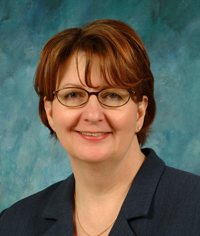 |
Robin Zagurski |
That includes not only police officers, fire fighters and security personnel, but also the behavioral health responders who went to the Hampton Inn near the Westroads Mall on that fateful night to be with the families who had lost loved ones.
“I think in a lot of cases, the behavioral health response is not thought of when people are planning a response to a disaster; however, we are the first ones called when something happens,” said Robin Zagurski, a clinical social worker in the UNMC psychiatry department. “It’s important because we can help people stay calm and respond in a proactive manner. We can help responders to take care of themselves and we can help prevent future problems by responding quickly so that people don’t go on to develop serious mental health crises afterwards.”
The people most at risk for Post Traumatic Stress Disorder are untrained responders, Zagurski said.
To educate behavioral health providers on how to respond in the acute aftermath of a disaster, a forum titled, “Psychiatric Dimensions Post-Disaster: A Public Health Perspective” will be held Wednesday from 2-4 p.m. at the Holiday Inn Convention Center, 3321 S. 72nd St.
Sponsored by Region 6 Behavioral Health Services, the UNMC Department of Psychiatry, Omaha Metropolitan Medical Response System (OMMRS), the Nebraska Department of Health and Human Services and the Nebraska Public Policy Center, the event also will cover the four phases of a behavioral health emergency, which are:
- The Heroic Phase — People rush to help, provide rescue and are happy to do so 24/7. This phase usually lasts several hours to a few days, depending on the size of the disaster.
- The Honeymoon Phase — More people come to aid and work long hours. Those affected by the disaster are glad and very thankful. This phase can last a few weeks to a couple months.
- The Disillusionment Phase — People begin to complain that they aren’t getting their fair share of donations/resources and stop getting along as well. Tempers flare. Everyone is tired. This typically lasts weeks to months.
- The Recovery Phase — People seem to find their rhythm again and begin working together and making plans for the future. This can last years.
|
|
“We’ve seen it with both 9/11 and Hurricane Katrina,” said Zagurski, who also is a disaster volunteer for the American Red Cross. “Disillusionment is very normal and common with disasters regardless.
“I think it’s important for people to understand these phases and that what we’re experiencing is what other people in other situations have experienced, so that they know feeling angry and frustrated is a common reaction to an event like this.”
As the featured speaker at the upcoming conference, Anthony Ng, M.D., assistant professor of psychiatry at the Uniformed Services University School of Medicine/Health Sciences and an assistant professor at George Washington University, will discuss how psychiatric and public health communities can prepare for the psychological and behavioral consequences of a disaster.
Three other speakers will talk about the local response to the Von Maur tragedy. They are:
- Dena Howard, chief programs officer of the American Red Cross Heartland Chapter;
- Denise Bulling, Ph.D., senior research director at the University of Nebraska Public Policy Center; and
- Dennis Snook, manager of emergency services for Region 6 Behavioral Healthcare.
“We hope to provide an understanding that disaster behavioral health is a very different set of skills than traditional behavioral health,” Zagurski said of the event’s purpose. “(Disaster behavioral health responders) do not pathologize and they don’t go in and provide standard treatments. What they do is make sure people are able to function and that they move forward.”
For more information or to register for the event, e-mail Zagurski at rzagursk@unmc.edu or contact Eileen McCarthy at Region 6 Behavioral Health Services at 444-6573.
Click here to see video related to this story.